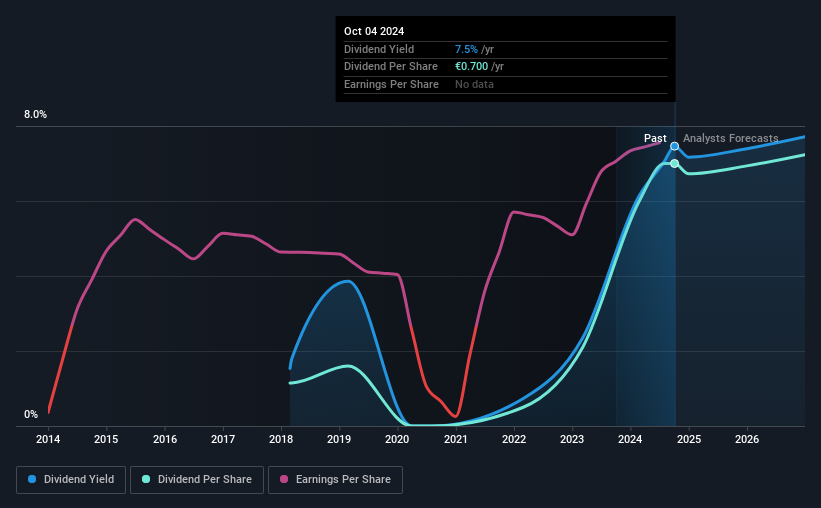Why You Might Be Interested In Bank of Ireland Group plc (ISE:BIRG) For Its Upcoming Dividend

Readers hoping to buy Bank of Ireland Group plc (ISE:BIRG) for its dividend will need to make their move shortly, as the stock is about to trade ex-dividend. The ex-dividend date occurs one day before the record date which is the day on which shareholders need to be on the company's books in order to receive a dividend. The ex-dividend date is an important date to be aware of as any purchase of the stock made on or after this date might mean a late settlement that doesn't show on the record date. In other words, investors can purchase Bank of Ireland Group's shares before the 10th of October in order to be eligible for the dividend, which will be paid on the 7th of November.
The company's next dividend payment will be €0.35 per share, and in the last 12 months, the company paid a total of €0.70 per share. Looking at the last 12 months of distributions, Bank of Ireland Group has a trailing yield of approximately 7.5% on its current stock price of €9.38. If you buy this business for its dividend, you should have an idea of whether Bank of Ireland Group's dividend is reliable and sustainable. As a result, readers should always check whether Bank of Ireland Group has been able to grow its dividends, or if the dividend might be cut.
See our latest analysis for Bank of Ireland Group
If a company pays out more in dividends than it earned, then the dividend might become unsustainable - hardly an ideal situation. Bank of Ireland Group paid out more than half (65%) of its earnings last year, which is a regular payout ratio for most companies.
When a company paid out less in dividends than it earned in profit, this generally suggests its dividend is affordable. The lower the % of its profit that it pays out, the greater the margin of safety for the dividend if the business enters a downturn.
Click here to see the company's payout ratio, plus analyst estimates of its future dividends.

Have Earnings And Dividends Been Growing?
Stocks in companies that generate sustainable earnings growth often make the best dividend prospects, as it is easier to lift the dividend when earnings are rising. If earnings decline and the company is forced to cut its dividend, investors could watch the value of their investment go up in smoke. That's why it's comforting to see Bank of Ireland Group's earnings have been skyrocketing, up 21% per annum for the past five years.
Many investors will assess a company's dividend performance by evaluating how much the dividend payments have changed over time. Bank of Ireland Group has delivered an average of 29% per year annual increase in its dividend, based on the past seven years of dividend payments. It's great to see earnings per share growing rapidly over several years, and dividends per share growing right along with it.
To Sum It Up
Should investors buy Bank of Ireland Group for the upcoming dividend? Bank of Ireland Group has an acceptable payout ratio and its earnings per share have been improving at a decent rate. Bank of Ireland Group ticks a lot of boxes for us from a dividend perspective, and we think these characteristics should mark the company as deserving of further attention.
In light of that, while Bank of Ireland Group has an appealing dividend, it's worth knowing the risks involved with this stock. For instance, we've identified 2 warning signs for Bank of Ireland Group (1 doesn't sit too well with us) you should be aware of.
A common investing mistake is buying the first interesting stock you see. Here you can find a full list of high-yield dividend stocks.
Valuation is complex, but we're here to simplify it.
Discover if Bank of Ireland Group might be undervalued or overvalued with our detailed analysis, featuring fair value estimates, potential risks, dividends, insider trades, and its financial condition.
Access Free AnalysisHave feedback on this article? Concerned about the content? Get in touch with us directly. Alternatively, email editorial-team (at) simplywallst.com.
This article by Simply Wall St is general in nature. We provide commentary based on historical data and analyst forecasts only using an unbiased methodology and our articles are not intended to be financial advice. It does not constitute a recommendation to buy or sell any stock, and does not take account of your objectives, or your financial situation. We aim to bring you long-term focused analysis driven by fundamental data. Note that our analysis may not factor in the latest price-sensitive company announcements or qualitative material. Simply Wall St has no position in any stocks mentioned.
About ISE:BIRG
Bank of Ireland Group
Provides banking and other financial services in the Republic of Ireland, the United Kingdom, and internationally.
Good value with adequate balance sheet and pays a dividend.
Similar Companies
Market Insights
Community Narratives



